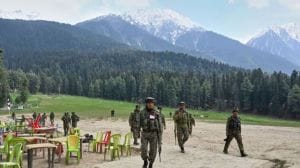The Supreme Court Wednesday asked the Centre and Reserve Bank of India (RBI) to produce before it records related to the decision-making process on the demonetisation of Rs 500 and Rs 1000 currency notes in 2016.
A five-judge Constitution Bench, comprising Justices S Abdul Nazeer, B R Gavai, A S Bopanna, V Ramasubramanian and B V Nagarathna, reserved its order after hearing extensive arguments over several days on different aspects of the 2016 decision including the deadline to exchange old currency notes.

Taking up a batch of 58 petitions challenging the government decision, the bench initially wondered if it was merely an academic debate given the passage of time. But it subsequently decided to go into the issue with the petitioners contending that the procedure prescribed in Section 26 (2) of the Reserve Bank of India Act, 1934, was given a go-by.
The provision states: “On recommendation of the Central Board, the Central Government may, by notification in the Gazette of India, declare that, with effect from such date as may be specified in the notification, any series of bank notes of any denomination shall cease to be legal tender save at such office or agency of the Bank and to such extent as may be specified in the notification.”
Appearing for one of the petitioners, Senior Advocate
P Chidambaram contended that as per the section, the recommendation should have “emanated” from the RBI but in the present case, the government had advised the central bank following which it made the recommendation.
He said when the government demonetised currency in the past – in 1946 and 1978 – it was done by way of a law made by Parliament.
Chidambaram charged the government with withholding documents related to the decision-making from the court and raised doubts whether the quorum, required for the RBI Central Board meeting, was met.
Story continues below this ad
Senior Advocate Jaideep Gupta, appearing for the RBI, pointed out that “the section does not talk about the process of initiation. It only says that the process will not end without the last two steps outlined in it… We gave the recommendation”.
He said “a situation like this can be initiated in many ways, and most definitely, by the Central government. Terrorism, for instance, is a problem about which RBI does not have intimate knowledge. It is perfectly normal for the Central government to raise the question, in response to which, the Bank formulates a recommendation”.
Attorney General R Venkataramani said demonetisation was not an isolated act, but part of a broader economic policy and, therefore, it is not possible for the RBI or the government to act in isolation. “They act in consultation… It is the lifeblood of the whole Act.”
On the argument over earlier demonetisation decisions, Gupta said the RBI had not agreed to the proposals following which the government of the day made the law.
Story continues below this ad
He denied that any document was being withheld from the court.
Venkataramani also said, “Nothing is being held back. Nothing is being hidden. Of course, we will show it to the court, if the court asks for it.”
In a brief affidavit, the RBI pointed out that the quorum, as determined by the RBI General Regulations, 1949, was met for the Central Board meeting. Apart from the then Governor and two Deputy Governors, five Directors nominated under provisions of the RBI Act were also present. “So the requirement that three of them should be nominated under 8(1) (b) and 8(1) (c) of the Act is met,” he told the court.
Chidambaram had said that under section 26(2), the government cannot demonetise all series of notes of a denomination. He urged the court to read down the provision so that the expression “any” therein will be read as “some”.
Story continues below this ad
Gupta however, opposed this, saying such an interpretation will only create confusion. “Can the government demonetise half the money, a quarter of it, or three-quarters of it? Therefore, this interpretation would create nothing but confusion,” he said.
He contended that the petitioners were asking the court to take away the Central government’s power to withdraw the entire currency in circulation on a recommendation of the Reserve Bank in a specific instance like hyperinflation.









